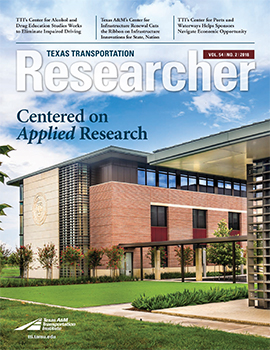When traffic safety experts think about the problem of impaired driving in Texas, words like troublesome and frustrating come to mind.

Despite dedicated efforts to make Texas roadways safer, the Lone Star State typically leads the country in the number of alcohol-related deaths, and always ranks in the top 10 states for the highest rate of impaired-driving deaths per population.
Of the 10,497 U.S. impaired-driving fatalities that occurred in 2016, Texas experienced 1,438 of them. Across the country, impaired driving accounts for 28 percent of all traffic deaths. In Texas, it’s 34 percent.
“Impaired driving is a huge problem in Texas, and there are numerous reasons for that,” says Research Scientist Troy Walden, director of the Center for Alcohol and Drug Education Studies (CADES) at the Texas A&M Transportation Institute (TTI). “One of the biggest hurdles we face is the cultural acceptance of drinking and driving.” Walden and his team of CADES researchers are dedicated to solving problems — through various education, outreach and research projects — caused by the irresponsible use of alcohol and other drugs.
Notable among these efforts is the Texas Impaired Driving Task Force that CADES organizes and manages each year through a Texas Department of Transportation (TxDOT) Traffic Safety Program grant. Approximately 60 members — professional safety advocates, transportation researchers, law enforcement, educators and members of the judiciary — serve on the task force.
The group targets specific problems with possible solutions to impaired driving at the state and local levels. As part of the TxDOT grant, CADES holds the Texas Statewide Impaired Driving Forum each year, which is open to professionals and the public concerned with impaired driving. (See https://www.dyingtodrink.org/.)
“TTI has played a big role in the partnership with TxDOT to address the most important driving safety issue in Texas,” says TxDOT Project Manager Frank Saenz. “The Impaired Driving Task Force and the annual Impaired Driving Forum are essential for Texans in bringing advocates to the table that have differing perspectives on what can be done to make our roadways safer.”
For example, Saenz and other experts know that ignition interlocks help save lives. In Texas, judges are required to ensure all drivers convicted of a second DWI have an ignition interlock installed on their vehicles. When the device detects alcohol on a driver’s breath, his or her vehicle won’t start.

“Despite the law, we’ve found that many of the judges — especially in small rural counties — aren’t requiring ignition interlocks,” says TTI Research Scientist David Hodges, who joined CADES two years ago to help inform judges, prosecutors, probation officers and law enforcement. Hodges is a retired county court at law judge. “We need to get more buy-in about the benefits of ignition interlocks. There’s plenty of research that shows they work. But they can’t work if they aren’t installed.” This summer alone, Hodges will help conduct seven training sessions about the benefits of ignition interlocks.
Researchers are also focusing on the problems associated with drug-impaired driving. CADES is currently developing a broad-ranging marijuana policy toolkit for Texas that deals with all aspects surrounding legalization or decriminalization.
“With numerous states relaxing their marijuana laws, Texas needs to be prepared,” says TTI Associate Transportation Researcher Jena Prescott. The Institute conducted a recent survey of 438 people in 25 Texas counties with the most alcohol-impaired fatal crashes and found that 40 percent of respondents favor marijuana legalization for recreational use, and 60 percent favor legalization for medicinal use.
“The toolkit will include a resource guide and fact sheets that address things like taxation and impairment detection,” Prescott says. “We want to create a blueprint that sets the stage so legislators and other stakeholders can determine the best course of action before changing our laws.”
 Texas always ranks in the top 10 states for the highest rate of impaired-driving deaths per population.
Texas always ranks in the top 10 states for the highest rate of impaired-driving deaths per population.

